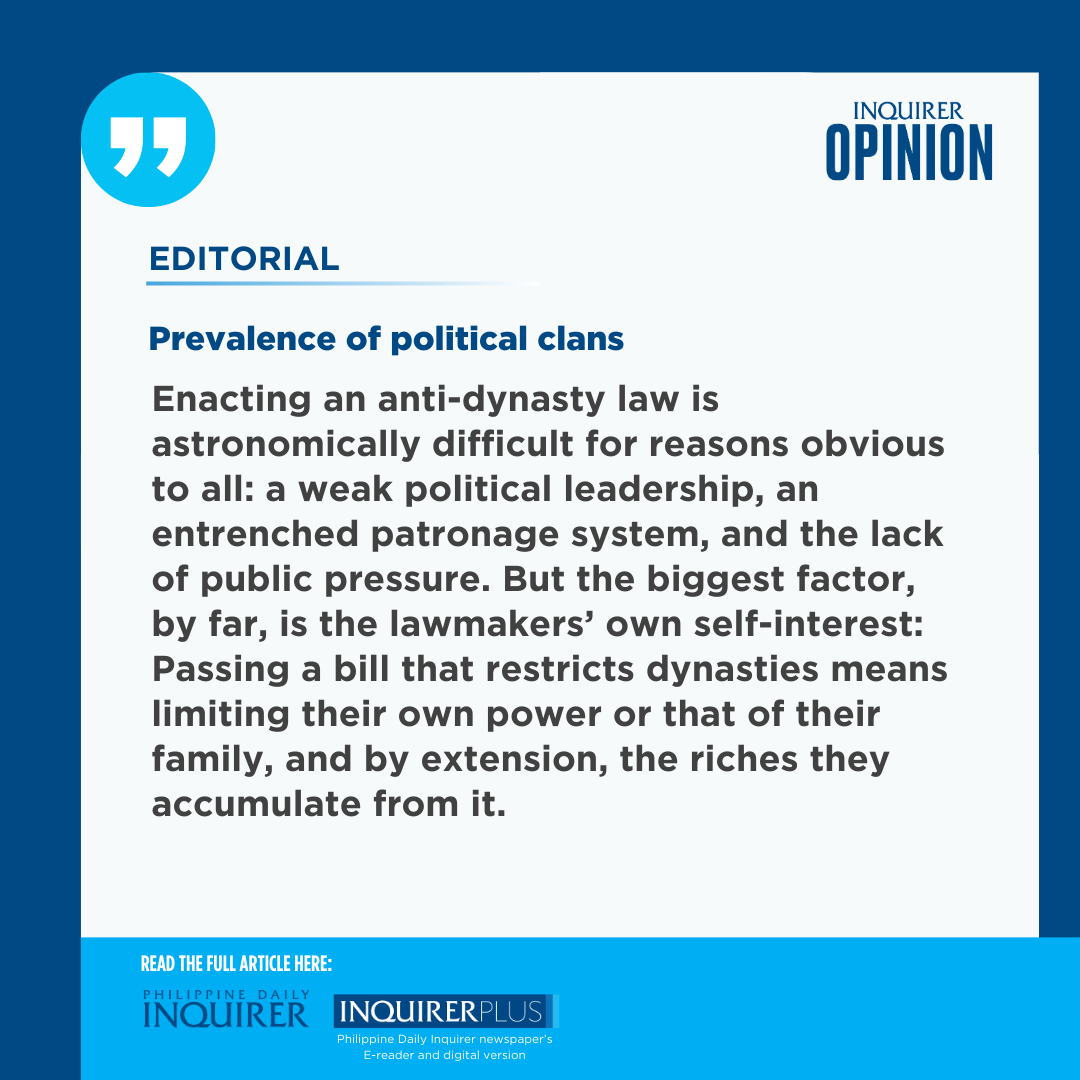Prevalence of political clans
As the period for the filing of candidacies for the 2025 midterm polls closes today, Filipino voters are left to assess the caliber of the aspirants who will be wooing them in the triennial circus that passes for elections in this country. Many will no doubt sigh in dismay upon beholding the alley of clowns endeavoring to become their next leaders.
But Filipinos, ever easily amused, still find entertainment in the antics of the characters seeking to fill more than 18,000 elective posts, from senator to town councilor, next year. There are the movie stars and starlets, now joined by YouTubers and TikTok influencers, hoping to convert their 15 minutes of fame into political clout. Others have resorted to age-old gimmickry, like the Tondo dweller who claims to be a senator’s fiancé, or the minister who identifies as a houseboy of the President’s family.
Article continues after this advertisementAmong them, Deo Balbuena, better known as “Diwata,” has thrown his hat in the ring as a nominee of Vendors Party-List, promising to serve his famous “pares,” or braised beef stew, in Congress and joking: “We’ll have unlimited rice and free soft drinks, too.”
Some may scoff at Balbuena’s ambitions as he pledges “to be the voice of all vendors.” But at least, he has a legitimate platform, being a self-made entrepreneur with an honest source of livelihood.
Majority always wins
The same cannot be said of the third kind of candidate that has held a firm grip on the Philippine electorate since time immemorial: political dynasties, whose progenitors and scions have taken advantage of their clout and influence.
Article continues after this advertisementOne product of a dynasty, Senate President Francis Escudero, had the gall to point out last week that there was no law prohibiting members of such clans from serving in the Senate at the same time. Using his signature tautological logic, he said: “In a democracy, the majority always wins and it just so happened that they won. That only means that most of the voters chose them.”
That’s rich, coming from the leader of a legislative body that has its share of dynasties.
Already a quarter of the Senate belongs to some of the country’s most influential political families, and it looks like the proportion will only grow. Senate President Pro Tempore Jinggoy Estrada is the half-brother of Sen. JV Ejercito. Sen. Alan Peter Cayetano’s sister, Sen. Pia Cayetano, is gunning for a second term. Sen. Cynthia Villar, mother of Sen. Mark Villar, is retiring as her term expires in 2025, but her daughter, Las Piñas Rep. Camille Villar, hopes to take her place.
Absence of an enabling legislation
Soon, if a recent Pulse Asia survey is to be believed, Sen. Raffy Tulfo may be joined by not one but two of his brothers, Erwin and Ben.
The prevalence of political dynasties is not limited to the Senate, as business leader Renato Valencia noted in a Feb. 19 piece for this paper, citing a 2019 study by dean Ronald Mendoza of the Ateneo School of Government. The study found that 75 percent of district representatives, 85 percent of governors, and 66.67 percent of mayors “could be considered as dynastic; that political dynasties tend to dominate the major political parties; and that candidates from political dynasties register larger winning ratios compared to nondynastic candidates.”
The 1987 Constitution strictly forbids political dynasties, but in the absence of an enabling legislation, the ban is practically useless, as any attempt at a bill, like the one filed by Sen. Robin Padilla in July, has met with a cool reception in both the Senate and the House.
No anti-dynasty bill has yet reached the plenary floor of either chamber in the 19th Congress. In fact, it has done so rarely since the framing of the Charter.
Cycle of power
Enacting an anti-dynasty law is astronomically difficult for reasons obvious to all: a weak political leadership, an entrenched patronage system, and the lack of public pressure. But the biggest factor, by far, is the lawmakers’ own self-interest: Passing a bill that restricts dynasties means limiting their own power or that of their family, and by extension, the riches they accumulate from it.
Filipinos, beaten to gullibility by decades of victimization, self-inflicted or otherwise, continue to support dynasties, not realizing it is their support that sustains the cycle of power consolidated in a few and poverty among the many.
Hopefully, members of Congress in the near future will finally find the courage and political will to pass the enabling law for the anti-dynasty bill as expressly mandated by the Constitution.
















